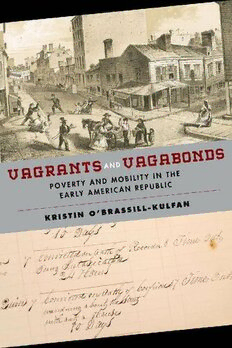
Vagrants and Vagabonds: Poverty and Mobility in the Early American Republic PDF
Preview Vagrants and Vagabonds: Poverty and Mobility in the Early American Republic
Vagrants and Vagabonds Early American Places is a collaborative project of the University of Georgia Press, New York University Press, Northern Illinois University Press, and the University of Nebraska Press. The series is supported by the Andrew W. Mellon Foundation. For more information, please visit www.earlyamericanplaces.org. Advisory Board Vincent Brown, Duke University Andrew Cayton, Miami University Cornelia Hughes Dayton, University of Connecticut Nicole Eustace, New York University Amy S. Greenberg, Pennsylvania State University Ramón A. Gutiérrez, University of Chicago Peter Charles Hoffer, University of Georgia Karen Ordahl Kupperman, New York University Joshua Piker, College of William & Mary Mark M. Smith, University of South Carolina Rosemarie Zagarri, George Mason University Vagrants and Vagabonds Poverty and Mobility in the Early American Republic kristin o’brassill- kulfan a New York University Press new york NeW YORK UNIVERSITY PRESS New York www.nyupress.org © 2019 by New York University All rights reserved References to Internet websites (URLs) were accurate at the time of writing. Neither the author nor New York University Press is responsible for URLs that may have expired or changed since the manuscript was prepared. Library of Congress Cataloging-in-Publication Data Names: O’Brassill-Kulfan, Kristin, author. Title: Vagrants and vagabonds : poverty and mobility in the early American republic / Kristin O’Brassill-Kulfan. Other titles: Poverty and mobility in the early American republic Description: New York : New York University Press, [2018] | Series: Early American places | Includes bibliographical references and index. Identifiers: LCCN 2017060989 | ISBN 9781479845255 (hbk. : alk. paper) Subjects: LCSH: Rogues and vagabonds—United States—History—19th century. | Vagrancy—United States—History—19th century. | Poor—United States—History—19th century. | United States—Social conditions—19th century. Classification: LCC HV4505 .O24 2018 | DDC 305.5/692097309034—dc23 LC record available at https://lccn.loc.gov/2017060989 New York University Press books are printed on acid- free paper, and their binding materials are chosen for strength and durability. We strive to use environmentally responsible suppliers and materials to the greatest extent possible in publishing our books. Manufactured in the United States of America 10 9 8 7 6 5 4 3 2 1 Also available as an ebook Contents Introduction 1 1 “She Is Doubtless a Very Vagrant”: Poverty and Mobility on the Legal Landscape 13 2 “A Wandering Life”: The Physical Landscape of Indigent Transiency 36 3 “The Removal of So Many Human Beings . . . Like Felons”: Forced Migration of the Poor 58 4 “Since He Was Free”: Vagabondage, Race, and Emancipation 84 5 “Punishment for Their Misfortunes”: Discretion, Incarceration, and Resistance 112 6 “It Was amongst the Vagrant Class . . . That Cholera Was Most Fatal”: Mobility, Poverty, and Disease 134 Conclusion 157 Acknowledgments 161 List of Abbreviations 165 Appendix 167 Notes 173 Index 221 About the Author 227 Introduction In 1841, a young Scottish woman named Isabella Stewart donned an outfit of men’s clothing, walked to Liverpool, and hired on to a ship’s crew under the name of “Billy Stewart.” She passed “as a sailor boy . . . dressed in the habiliments, neatly rigged from top to toe” and “actually performed the duty of a lad on board . . . for several days” before the crew’s suspicions led to the revealing of her identity as “a healthy, stout female, 16 years of age.” Stewart was punished for her deception by the captain, A. Turley, with passing the rest of the voyage in steerage wearing “female apparel.” Newspapers throughout the antebellum United States reported on Stewart’s escapades. But underpinning the interest stimu- lated by the thought of a dainty young woman performing the hard labor of seafaring was a question of the relationship between subsistence and travel: according to the National Gazette, Stewart was “a destitute girl, who had taken this method to get a passage to America.”1 Participation in the Atlantic world’s economy of makeshifts sometimes required going to great lengths, and often, as it did for Stewart, great distances.2 Stewart’s illicit mobility involved a complete revamping of her identity for the sake of cobbling together a living for herself, like so many others traveling to and residing within the antebellum United States. Unlike many single- paragraph nineteenth- century newspaper sensations, how- ever, Stewart’s notoriety was not limited to this one dramatic episode. Over a year after her arrival in the United States, she graced headlines in Philadelphia as “The Sailor Girl” about “whose adventures . . . a pretty
